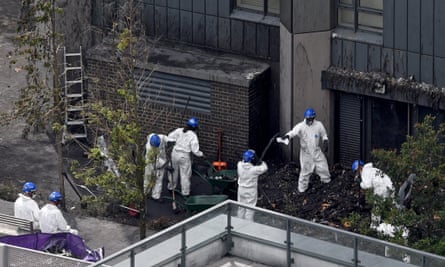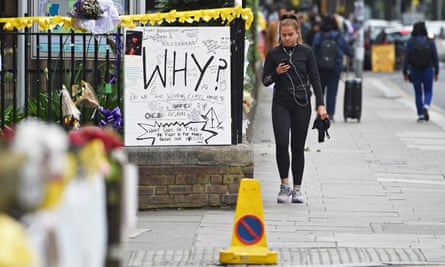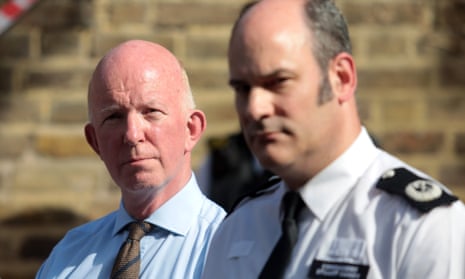The government is facing calls to formally take control of Kensington and Chelsea council after its Tory leader said he and his deputy would step down amid criticism over the local authority’s response to the Grenfell Tower disaster.
London’s mayor, Sadiq Khan, was backed by shadow communities secretary Andrew Gwynne on Saturday in calling for commissioners to be appointed to run the embattled council.
Khan said commissioners could step in until local elections are held and act in the best interests of residents “who quite rightly feel desperately neglected”. The government had no option but to appoint “untainted” leaders who had “a genuine empathy for local people and the situation they face”, he added.
Labour backed Khan’s call, saying oversight of long subcontracting chains and checks and accountability for outsourced services like housing had failed.
Gwynne told BBC Breakfast: “One of the powers the secretary of state for communities and local government has is to instigate an investigation into corporate governance, because there is clearly a corporate governance failure at Kensington and Chelsea council.
“He can then also instruct commissioners – now this is a very rarely, and rightly rarely used power – … to go in and take control of the local authority for a temporary period. I feel that is certainly a power which should be used in this instance.”
He added: “Local councillors still remain in place, there is still that democratic accountability, but it means that central government takes the day-to-day control, through appointed commissioners, in running the council. It is clear if we are to get a grip on what has gone dreadfully wrong in Kensington and Chelsea then central government needs to get its act together as well.”
The shadow housing secretary, John Healey, also told BBC Radio 4’s Today programme: “It’s right, it’s necessary, it is a big step for government to take, but this council has not been doing the job for the Grenfell Tower residents or the community around north Kensington, especially on housing and family support after the fire.
“But most importantly, and this is the point that others have made, the public and residents’ trust can’t be restored by simply replacing the leader and deputy leader by other politicians from the same political group at this stage.
“This is where ministers need to step in, they’ve been off the pace at every stage in this tragedy, too slow to grasp the scale of the problems and too slow to act, and they need to act on this front now.”
However, Yvette Williams, one of the organisers of the Justice 4 Grenfell campaign group, said the community would not accept commissioners imposed on them without consultation.
She said survivors and victims’ families were “very, very angry” and told Radio 4’s Today: “I do support the mayor in terms of a commissioner-led borough, but how are those people going to be selected? That’s the process we don’t know.”
Council leader Nicholas Paget-Brown became the focus of protests over the Conservative-run authority’s actions before and after the deadly inferno, culminating in a bungled attempt to hold a meeting about the blaze in private that ultimately led to his departure.
Downing Street and the communities secretary, Sajid Javid, followed news organisations including the Guardian in condemning Paget-Brown’s decision to call off the first post-fire council cabinet meeting when the high court ruled he could not stop journalists from attending it .
The initial attempt to block reporters and the public from the meeting was the subject of a successful 11th-hour legal challenge led by the Guardian.
Paget Brown said he was departing to accept some responsibility for “perceived failings” by the council.
The council had already been relieved of its direct role in caring for survivors earlier this month, when a dedicated response team was created amid concerns at the slow pace of efforts to provide survivors and bereaved families with housing and information.
Paget-Brown, a councillor for more than 30 years, at first resisted calls to go. But on Friday evening he said he must “accept [his] share of responsibility”. He said he would depart as soon as a successor was in place, and that his deputy leader, Rock Feilding-Mellen, who is also responsible for housing, would go as well.
Feilding-Mellen was the councillor ultimately responsible for the refurbishment of Grenfell Tower with the cladding that is widely believed to have fuelled the blaze that killed at least 80 people. It had emerged earlier on Friday that the council had approved the replacement of fire-resistant zinc cladding with cheaper aluminium panels.
Documents seen by the Guardian showed that this saved £293,368. The project manager for the housing organisation in the borough emailed the consultant to saying they needed to find “good costs” for Feilding-Mellen.
Paget-Brown said a key factor in his departure was his decision to halt to a cabinet meeting after failing to have the media barred.

Paget-Brown, who said having journalists present could prejudice the public inquiry into the disaster, blamed the advice of lawyers for his decision.
He said: “In particular, my decision to accept legal advice that I should not compromise the public inquiry by having an open discussion in public yesterday has itself become a political story. And it cannot be right that this should have become the focus of attention when so many are dead or still unaccounted for.” The new leader would pick their own cabinet, Paget-Brown added.
Downing Street was understood to be furious at the chaotic scenes at the meeting, which saw Labour opposition councillors shouting furiously as Paget-Brown announced that it would have to end because he could not discuss the fire with journalists in the room.
A No 10 spokeswoman said the prime minister “would have expected the council to respect” the high court ruling. She said: “Our view is that access to democracy should always be easy, and we think that’s vital if people want to retain confidence in our democratic system. I can’t obviously speak for the council, but there are rules that state all meetings must be open to the public except in certain circumstances.”
Javid said: “Access to the democratic process should always be open and transparent.”
While it is understood that there was no overt pressure from No 10 for Paget-Brown and his team to step down, ministers welcomed the move, and immediately signalled a more interventionist approach towards the council as it struggles to deal with the aftermath of one of the UK’s most serious postwar civil disasters.

Greg Hands, the Conservative MP for Chelsea and Fulham, who also has the role of minister for London, said Paget-Brown made the “right decision”. He tweeted: “I will be working closely with Kensington & Chelsea councillors to ensure a new council leader who commands support within the group and the wider public and from government. Lessons need to be learned & action taken in response to Grenfell Tower.”
Meanwhile, the Labour MP for Kensington, Emma Dent Coad, said: “Years of neglect and disdain for tenants contributed to the terrible fire at Grenfell Tower. Nick Paget-Brown and the cabinet must take responsibility for the cladding decisions, including the use of lower-quality cladding that was not fire resistant, fire inspections, and other issues which may have contributed to the fire. They should also be held to account for dismissing the fire safety concerns of residents.” Robert Atkinson, leader of the council’s Labour group, who expressed fury as the cabinet meeting was closed, said Paget-Brown had “totally failed” since the disaster. He told Sky News: “My reaction is one of relief because, with the departure of the council leader, perhaps the council can now start to organise itself to provide the services that the residents so desperately need.”
A spokesman for the Radical Housing Network, of which Grenfell Action Group is a member, welcomed the resignation: “His council’s response both before and after the tragedy has been incompetent and callous; the only concern has been to avoid scrutiny. His appalling resignation statement shows a dogged inability to understand the concerns of the community he is meant to represent. Residents are angry, let down, and yet all Mr Paget-Brown can do is pass the buck.
“These resignations are just the beginning. Criminal charges must follow for those responsible, and the recently announced public inquiry into Grenfell must deliver real justice.”
Earlier on Friday, the organisation that manages Grenfell Tower said its chief executive would step aside to “concentrate on assisting with the investigation and inquiry”. Kensington and Chelsea Tenant Management Organisation said Robert Black would be replaced by an interim chief executive.
